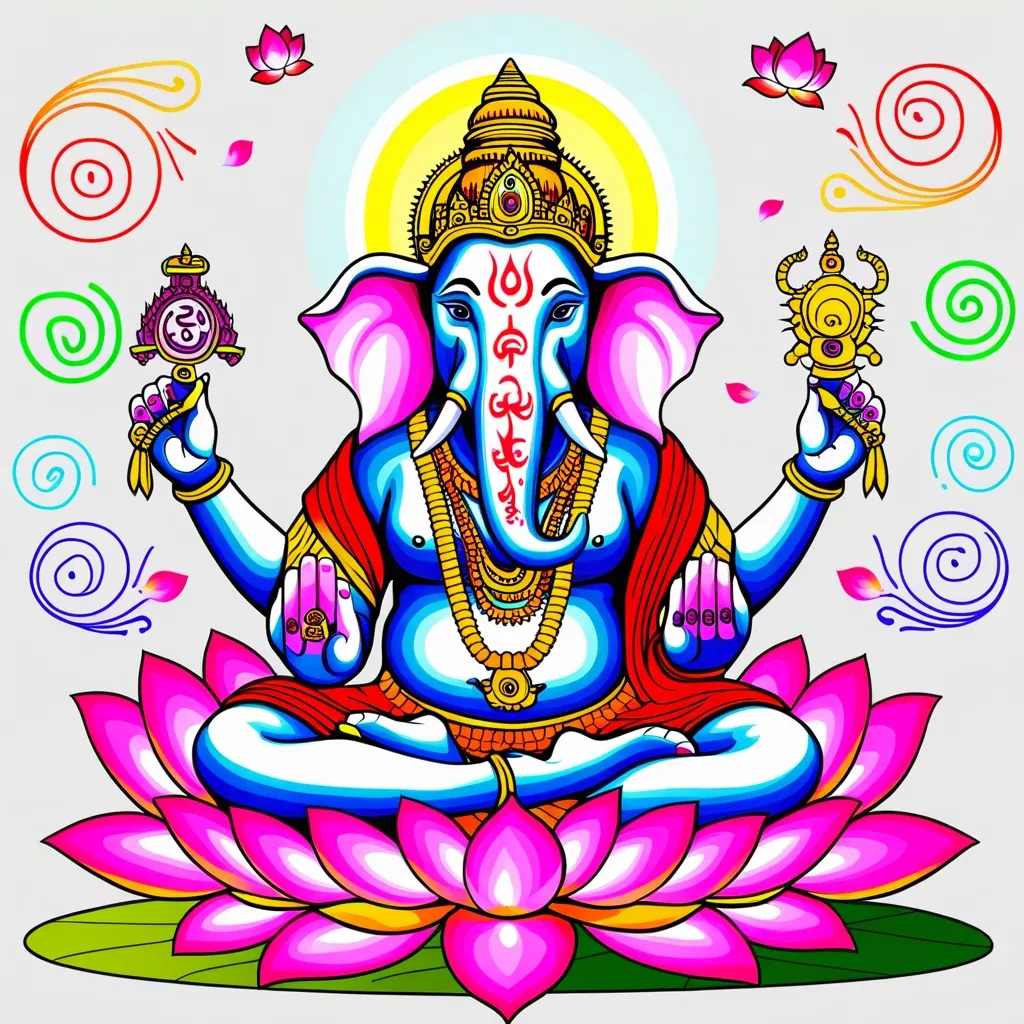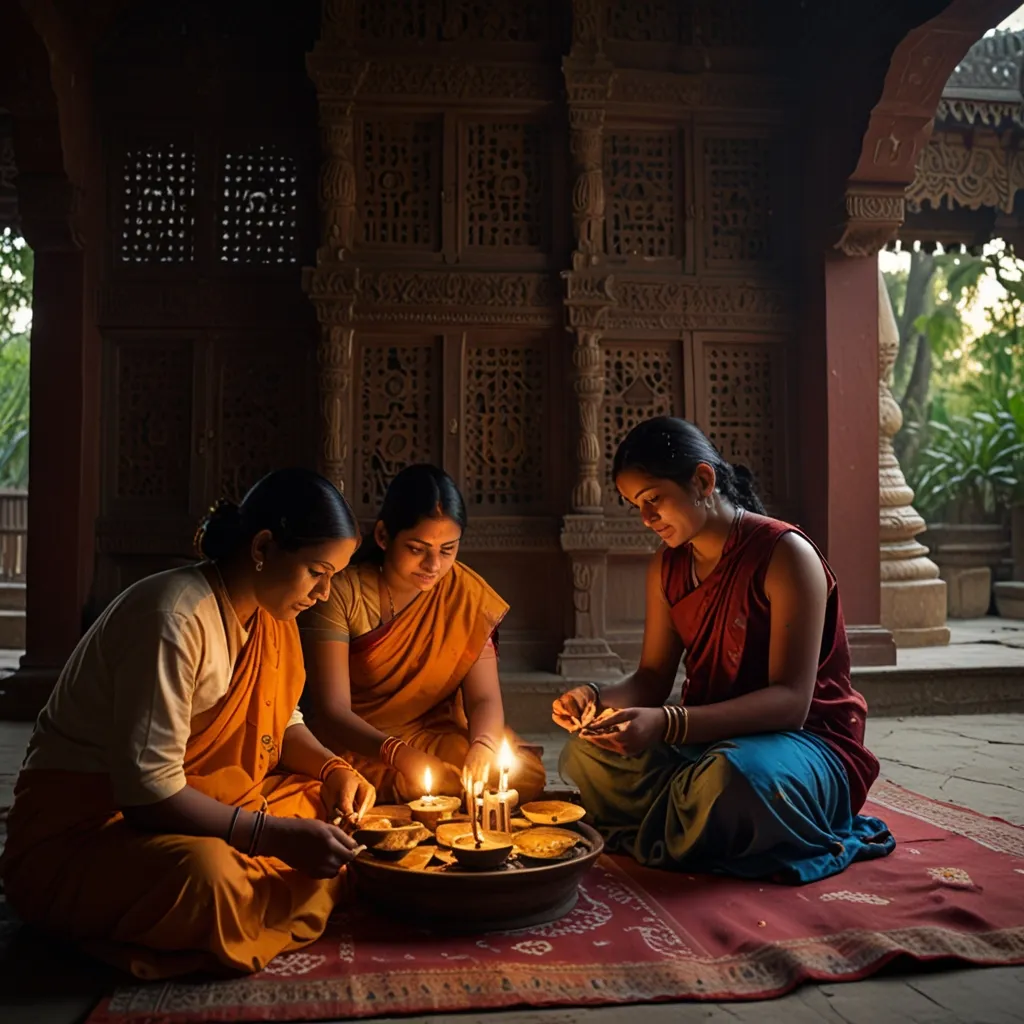Lord Ganesha: The Elephant-Headed God Who Captures Hearts
Hey there! Let’s chat about one of the coolest deities in Hindu mythology - Lord Ganesha. This elephant-headed god isn’t just a pretty face (or trunk). He’s got some serious star power in the Hindu world, and for good reason.
So, picture this: a god with an elephant’s head, a big belly, and four arms. Sounds wild, right? But that’s our guy Ganesha. He’s not your average deity. He’s like the superhero of the Hindu pantheon, swooping in to save the day by removing obstacles and sprinkling a little wisdom dust wherever he goes.
Now, you might be wondering, “How did this elephant-headed dude come to be?” Well, buckle up, because it’s a wild ride.
Imagine you’re Parvati, the wife of the big boss god Shiva. You’re chilling at home, wanting to take a bath, but you need someone to guard the door. What do you do? If you’re Parvati, you create a son from the dirt on your body (because why not?). That’s Ganesha for you.
But here’s where it gets crazy. Shiva comes home, doesn’t recognize his own son, and in a moment of “who’s this guy blocking my way?”, he lops off Ganesha’s head. Talk about family drama! Parvati, understandably, is not happy. To make amends, Shiva promises to bring Ganesha back to life with the head of the first creature he sees - which happens to be an elephant. And voila! Our elephant-headed god is born.
This story isn’t just a cool myth. It’s packed with symbolism. Ganesha’s elephant head represents wisdom, his big ears show he’s a great listener, and his trunk symbolizes his ability to distinguish right from wrong. Even his pot belly has a meaning - it shows he can digest both the good and bad in life. Pretty deep stuff, huh?
But Ganesha isn’t just about looks. He’s got a job to do, and boy, does he do it well. He’s known as the “Remover of Obstacles”, which is like being the superhero of everyday life. Got a big exam coming up? Ganesha’s got your back. Starting a new business? Ganesha’s your go-to guy. He’s like that friend who always knows how to make things better.
And it’s not just about removing obstacles. Ganesha’s also the patron of wisdom and knowledge. Think of him as the ultimate study buddy. He’s believed to have written down the epic Mahabharata as it was recited. Talk about multitasking - removing obstacles and taking notes!
Now, let’s talk about Ganesha’s ride. Most gods have majestic animals as their vehicles. Ganesha? He rolls with a mouse. Yep, you heard that right. A tiny mouse. But don’t let size fool you. This mouse represents Ganesha’s ability to gnaw through any problem, no matter how small. It’s like having a tiny, furry problem-solver at your disposal.
Ganesha’s also got a sweet tooth. He’s often depicted holding a plate of laddus (Indian sweets). It’s not just because he likes to snack (though who doesn’t?). These sweets represent the sweetness of the atman (soul) and the joy of self-realization. Deep stuff from a guy who loves his desserts!
But Ganesha isn’t just about mythology and symbolism. He’s a big part of everyday life for millions of people. Take Ganesh Chaturthi, for example. It’s a festival that celebrates Ganesha’s birthday, and it’s like the biggest, craziest party you can imagine. People create elaborate idols of Ganesha, some as tall as buildings! They worship these idols for days, and then immerse them in water. It’s a beautiful cycle that represents the circle of life.
And here’s the cool thing about Ganesha - he’s not just for Hindus. His influence has spread far and wide. In Buddhism, he’s known as Vinayaka. In Thailand, he’s the god of arts and academics. Even in Japan, you’ll find Ganesha hanging out in some temples. He’s like the rock star of deities, crossing cultural boundaries with ease.
But what makes Ganesha really special is how accessible he is. You don’t need to be a scholar or a saint to connect with him. Got a problem? Talk to Ganesha. Need some wisdom? Ganesha’s your guy. Want to start something new? You know who to call. He’s like that friend who’s always there for you, no matter what.
And the benefits of worshipping Ganesha? They’re pretty sweet (pun intended). People believe he brings prosperity, good fortune, and wisdom. But it’s not just about material gains. Ganesha is said to help you overcome your fears, become more patient, and gain knowledge. It’s like personal growth with a divine touch.
One of the coolest things about Ganesha is his five powers, or shaktis. These aren’t just random superpowers. They’re about fostering love in your family, spreading that love to your community, and bringing abundance into your life. It’s like Ganesha’s giving you a roadmap to a happier, more fulfilling life.
But here’s the best part about Ganesha - he’s for everyone. You don’t need to perform elaborate rituals or make grand offerings. A simple prayer, a small sweet, or even just a thought is enough. Ganesha’s not about the fancy stuff. He’s about the connection, the intention behind your worship.
So, whether you’re facing a big challenge, starting a new chapter in your life, or just need a little divine intervention to get through your day, Ganesha’s got your back. He’s the god of new beginnings, the remover of obstacles, and let’s face it, probably the coolest-looking deity out there.
Remember, life’s going to throw obstacles your way. That’s just how it is. But with Ganesha in your corner, you’ve got a powerful ally. He’s not just about removing those obstacles. He’s about giving you the wisdom to navigate them, the strength to overcome them, and maybe a laddu or two to sweeten the journey.
So next time you’re feeling stuck, or you’re about to embark on something new, why not give a little nod to the elephant-headed god? Who knows, you might just find that obstacles start melting away, and doors start opening up. After all, that’s the magic of Ganesha - making the impossible possible, one obstacle at a time.
In the end, Ganesha isn’t just a god. He’s a reminder that we all have the power to overcome obstacles, gain wisdom, and find joy in life’s journey. And if that comes with an elephant head and a love for sweets? Well, that’s just the cherry on top of the laddu.






